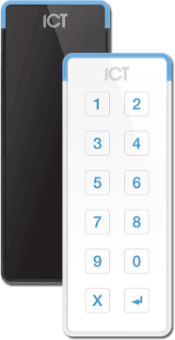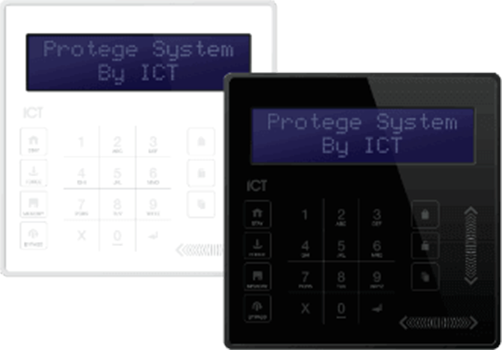Video MGMT System
 Access Control
Access Control
Voice & Data Wiring
 Burglar Alarm
Burglar Alarm
 Fire Alarm
Fire Alarm
Video MGMT System
Voice & Data Wiring
An IP Camera (Internet Protocol) is one that sends and receives data via a computer network and the Internet (hence its name). These types of cameras are typically used for surveillance monitoring and are either “centralized” (meaning they require a central network video recorder to handle the recording, video and alarm management) or “decentralized” (meaning no NVR is necessary and the footage can be recorded and managed from any local or remote storage media). Though a webcam is essentially an internet-based camera, the term “IP” is typically reserved for surveillance equipment.
IP cameras are most commonly found in commercial and industrial settings, but due to their cost effectiveness and ease of use, they are becoming more popular for home security systems as well. Thanks to advanced technology and the diminished need for more and bulkier equipment, internet protocol cameras can be as small as a few inches long and are therefore great for monitoring small and large spaces alike, including everywhere from safes to private offices and from retail store floors to parking lots. They can be placed beside a computer, on a windowsill or even inside of a teddy bear (think—nanny cam). The uses for this type of equipment are virtually endless.
Many homeowners have upgraded their systems to include IP cameras for several reasons. As mentioned above, they are very discreet, so can be used to monitor even the smallest of spaces without letting others know that they’re being monitored. These types of cameras are great for families with small children who want to ensure that their loved ones are being properly cared for when in the hands of a babysitter or nanny; for households with paid staff; and for families with teens. IP cameras installed in home security systems have been used to serve a number of purposes, including preventing theft, ensuring that teenagers are behaving “properly” and that household staff are making the best use of their paid-for time.

Business owners have a lot to deal with as is without adding to the mix vandalism, theft or employee misconduct. IP cameras have been used to help business owners gain more control over their operations. On one end of the spectrum, they are used to protect the business from theft and vandals. Business owners can place cameras discreetly throughout their buildings or even in their parking lots. If something happens—for instance, a hit and run accident or a theft in store—the business owner can pull up high-resolution footage of the incident and use it to identify the perpetrator. Today’s Internet Protocol technology is so advanced that it can capture the image of a license plate from hundreds of feet away, or capture a person’s image as clearly as if a photo was taken head on.
On the other end of the spectrum, IP cameras can be used to monitor employee behavior. Unfortunately, many business owners have to deal with dishonest employees who steal from the company, goof off on the job or perform other activities that are outside their scope of work. These employees can cost employers a lot of money, which is why it is important that business owners understand how their employees are behaving when they’re not around. Internet protocol cameras can help with that. When employees know that they’re being monitored, they are more likely to maintain high productivity levels and less likely to do something that may compromise the integrity of the company or their job.
IP cameras are especially useful for businesses that employ night crews, such as call center staff, cleaning or maintenance crews or inventory management teams.

Whereas analog and analog over digital cameras require a video cable to transmit footage to a monitor or DVR, an IP camera has the built in ability to transfer images over a data connection, which can be Ethernet, USB and Wi-Fi. An IP model is connected directly to the network just like any other network device, such as a printer or a scanner.
Though an IP camera captures the same high quality images and works in much the same way as a digital one, its ability to compress those images and transmit them automatically over a network is what sets them apart from their predecessors. If a building is already equipped with a network—such as a computer network or a cable network—the infrastructure is already in place for an internet system; all you have to do is simply connect them in much the same way that you would connect your laptop to your Wi-Fi or your phone to your phone line.
If your goal is to add just one or a few cameras, you can opt for a decentralized network in which the camera stores its own footage and comes with its own control interface. However, if your goal is to set up a comprehensive security system, you may want to opt for a centralized network, in which all footage is streamed to an NVR for an operator to view and control.
When it comes to internet cameras, there are three types of systems you can implement:
Wireless Networks:

These networks use Wi-Fi to transmit data to and from a wireless modem. They are easy to setup and customize, but are at an increased risk for unauthorized access.
Wired Networks:

Wired networks connect to a broadband modem or router through Ethernet cables and are the fastest and most secure way to connect your IP cameras. There is little to no risk of signal interruption or interference, and virtually no risk for unauthorized access.
Cellular Network:

Though probably the most convenient option of the three, it also happens to be the slowest. A cellular network is more secure than Wi-Fi and extremely easy to set up, as most IP cameras come fully equipped with cellular transmitters, requiring little to no installation. All that said, a cellular network is probably the most expensive of the three options.
While the initial cost of switching from an analog system to a network system, or of implementing an all-new IP system from scratch, may seem overwhelming, it is a worthwhile investment. A single IP camera can take the place of three to four analog ones, doing more work than the multiple pieces of equipment combined. This gives you more flexibility and scalability, allowing you the option to expand or contract your system as you please. Additionally, these types of equipment can store their own footage or be controlled from a single NVR, your system will require less equipment and therefore, less maintenance.
Technicalities aside, IP cameras have proven to be highly effective monitoring tools and have aided in the deterrence and prevention of thousands of crimes, not to mention the identification and prosecution of just as many criminal suspects.
Want to install security camera systems in West Hartford, CT? Give Mammoth Security a call today and we’ll be happy to discuss the best options for your needs
NOT COMPLETELY SURE?
860-748-4292